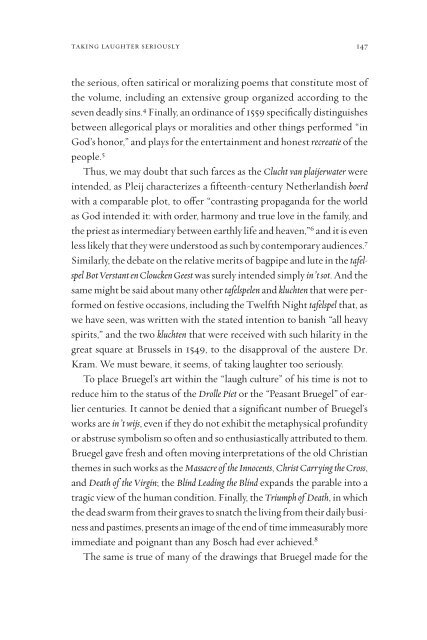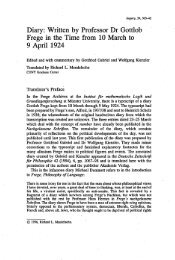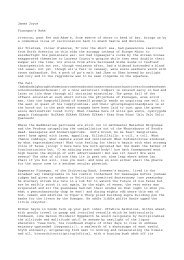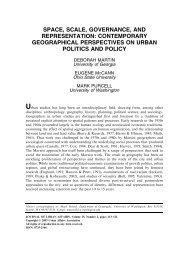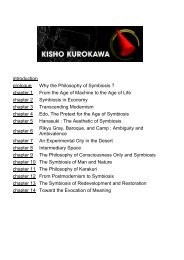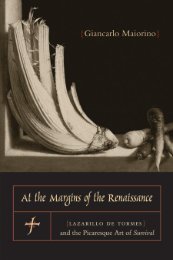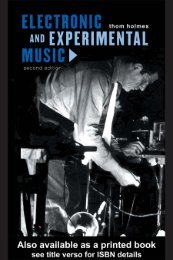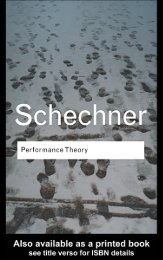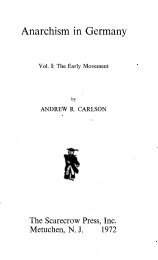Pieter Bruegel and the Art of Laughter - AAAARG.ORG
Pieter Bruegel and the Art of Laughter - AAAARG.ORG
Pieter Bruegel and the Art of Laughter - AAAARG.ORG
Create successful ePaper yourself
Turn your PDF publications into a flip-book with our unique Google optimized e-Paper software.
taking laughter seriously 147<br />
<strong>the</strong> serious, <strong>of</strong>ten satirical or moralizing poems that constitute most <strong>of</strong><br />
<strong>the</strong> volume, including an extensive group organized according to <strong>the</strong><br />
seven deadly sins. 4 Finally, an ordinance <strong>of</strong> 1559 specifically distinguishes<br />
between allegorical plays or moralities <strong>and</strong> o<strong>the</strong>r things performed “in<br />
God’s honor,” <strong>and</strong> plays for <strong>the</strong> entertainment <strong>and</strong> honest recreatie <strong>of</strong> <strong>the</strong><br />
people. 5<br />
Thus, we may doubt that such farces as <strong>the</strong> Clucht van plaijerwater were<br />
intended, as Pleij characterizes a fifteenth-century Ne<strong>the</strong>rl<strong>and</strong>ish boerd<br />
with a comparable plot, to oªer “contrasting propag<strong>and</strong>a for <strong>the</strong> world<br />
as God intended it: with order, harmony <strong>and</strong> true love in <strong>the</strong> family, <strong>and</strong><br />
<strong>the</strong> priest as intermediary between earthly life <strong>and</strong> heaven,” 6 <strong>and</strong> it is even<br />
less likely that <strong>the</strong>y were understood as such by contemporary audiences. 7<br />
Similarly, <strong>the</strong> debate on <strong>the</strong> relative merits <strong>of</strong> bagpipe <strong>and</strong> lute in <strong>the</strong> tafelspel<br />
Bot Verstant en Cloucken Geest was surely intended simply in ’t sot. And <strong>the</strong><br />
same might be said about many o<strong>the</strong>r tafelspelen <strong>and</strong> kluchten that were performed<br />
on festive occasions, including <strong>the</strong> Twelfth Night tafelspel that, as<br />
we have seen, was written with <strong>the</strong> stated intention to banish “all heavy<br />
spirits,” <strong>and</strong> <strong>the</strong> two kluchten that were received with such hilarity in <strong>the</strong><br />
great square at Brussels in 1549, to <strong>the</strong> disapproval <strong>of</strong> <strong>the</strong> austere Dr.<br />
Kram. We must beware, it seems, <strong>of</strong> taking laughter too seriously.<br />
To place <strong>Bruegel</strong>’s art within <strong>the</strong> “laugh culture” <strong>of</strong> his time is not to<br />
reduce him to <strong>the</strong> status <strong>of</strong> <strong>the</strong> Drolle Piet or <strong>the</strong> “Peasant <strong>Bruegel</strong>” <strong>of</strong> earlier<br />
centuries. It cannot be denied that a significant number <strong>of</strong> <strong>Bruegel</strong>’s<br />
works are in ’t wijs, even if <strong>the</strong>y do not exhibit <strong>the</strong> metaphysical pr<strong>of</strong>undity<br />
or abstruse symbolism so <strong>of</strong>ten <strong>and</strong> so enthusiastically attributed to <strong>the</strong>m.<br />
<strong>Bruegel</strong> gave fresh <strong>and</strong> <strong>of</strong>ten moving interpretations <strong>of</strong> <strong>the</strong> old Christian<br />
<strong>the</strong>mes in such works as <strong>the</strong> Massacre <strong>of</strong> <strong>the</strong> Innocents, Christ Carrying <strong>the</strong> Cross,<br />
<strong>and</strong> Death <strong>of</strong> <strong>the</strong> Virgin; <strong>the</strong> Blind Leading <strong>the</strong> Blind exp<strong>and</strong>s <strong>the</strong> parable into a<br />
tragic view <strong>of</strong> <strong>the</strong> human condition. Finally, <strong>the</strong> Triumph <strong>of</strong> Death, in which<br />
<strong>the</strong> dead swarm from <strong>the</strong>ir graves to snatch <strong>the</strong> living from <strong>the</strong>ir daily business<br />
<strong>and</strong> pastimes, presents an image <strong>of</strong> <strong>the</strong> end <strong>of</strong> time immeasurably more<br />
immediate <strong>and</strong> poignant than any Bosch had ever achieved. 8<br />
The same is true <strong>of</strong> many <strong>of</strong> <strong>the</strong> drawings that <strong>Bruegel</strong> made for <strong>the</strong>


